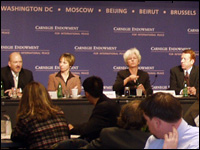Registration
You will receive an email confirming your registration.
IMGXYZ828IMGZYXSenior Associates Marina Ottaway and Michele Dunne presented the findings of their recent paper, Incumbent Regimes and the "King's Dilemma" in the Arab World: Promise and Threat of Managed Reform. J. Scott Carpenter from The Washington Institute participated in the panel as a discussant. Carnegie's Tom Carothers, Vice President of Studies and Senior Associate in the Democracy and the Rule of Law program, moderated the discussion.
Tom Carothers pointed out the importance of this paper in identifying the challenges facing elite-driven reform in the Arab world. He suggested that this paper also helps in putting the role of the international community in the region’s political order in a truer perspective.
Marina Ottaway argued that the U.S. reform agenda for the Arab world relies heavily on ruling regimes and secular elements within these societies. She suggested that this approach is appealing because it guarantees stability and avoids disruptive political transitions. The drawbacks however are considerable because ruling establishments are not willing to concede political power and secular opposition parties are weak.
Ottaway then discussed the three prevalent patterns of elite-driven reforms in the Arab world. The first defines the experiences of countries like Morocco, in which the ruling regime focused on advancing human rights and economic reforms. The second is most noticeable in Bahrain, in which the ruler embraced institutional reforms by introducing elections and representative branches of the government. The third pattern is observed in countries like Algeria and Yemen, in which ruling establishments recognized the importance of including the opposition in the political process. In all these patterns however, democratic progress remains slow and unpromising.
Michele Dunne discussed the motivations and the impediments facing reformers within ruling establishments. She suggested that they are concerned about the fact that their nations are lagging behind in the era of globalization and open international markets. Those reformers tend to believe that they are more progressive than most of the opposition groups in their countries, and therefore disapprove of international pressure that favors these groups. Nonetheless, they encourage international pressure that they can use to gain concessions from hardliners within the ruling establishments.
J. Scott Carpenter discussed the need to recognize both sides of the reform equation: the ruling establishments and progressives within these establishments, and on the other hand civil society and political opposition groups that are striving to achieve reform. He also pointed out the issue of legitimacy in any reform enterprise. He concluded by suggesting that U.S. policy should take into consideration U.S. interests, regional stability, and the needs of reformers that are not associated with ruling establishments in the societies in question.
Audience members asked about the role of civil society and the fate of Arab democracy in light of the excessive fetters employed by ruling regimes. Ottaway explained that civil society is weak in the Arab world and that reform in the end is a product of power relations. Michele Dunne emphasized that establishment-sponsored political change in the Arab world failed to go far enough to motivate the public to actively demand meaningful reform.
The paper is part of a broader project by the Carnegie Endowment’s Middle East program, which aims to examine the major actors in the Arab world’s political transformation.
